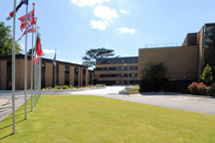| |||||
| Decades: | |||||
|---|---|---|---|---|---|
| See also: | |||||
Events in the year 2017 in Estonia .
| |||||
| Decades: | |||||
|---|---|---|---|---|---|
| See also: | |||||
Events in the year 2017 in Estonia .

The Republic of Estonia gained its independence from the Russian Empire on 24 February 1918 and established diplomatic relations with many countries via membership of the League of Nations. The forcible incorporation of Estonia into the Soviet Union in 1940 was not generally recognised by the international community and the Estonian diplomatic service continued to operate in some countries. Following the restoration of independence from the Soviet Union, Russia was one of the first nations to re-recognize Estonia's independence. Estonia's immediate priority after regaining its independence was the withdrawal of Russian forces from Estonian territory. In August 1994, this was completed. However, relations with Moscow have remained strained primarily because Russia decided not to ratify the border treaty it had signed with Estonia in 1999.

The European Centre for Medium-Range Weather Forecasts (ECMWF) is an independent intergovernmental organisation supported by most of the nations of Europe. It is based at three sites: Shinfield Park, Reading, United Kingdom; Bologna, Italy; and Bonn, Germany. It operates one of the largest supercomputer complexes in Europe and the world's largest archive of numerical weather prediction data.

Tallinn is the capital and most populous city of Estonia. Situated on a bay in north Estonia, on the shore of the Gulf of Finland of the Baltic Sea, Tallinn has a population of about 454,000 and administratively lies in the Harju maakond (county). Tallinn is the main governmental, financial, industrial, and cultural centre of Estonia. It is located 187 km (116 mi) northwest of the country's second largest city, Tartu, however only 80 km (50 mi) south of Helsinki, Finland, also 320 km (200 mi) west of Saint Petersburg, Russia, 300 km (190 mi) north of Riga, Latvia, and 380 km (240 mi) east of Stockholm, Sweden. From the 13th century until the first half of the 20th century, Tallinn was known in most of the world by variants of its other historical name Reval.

Tallinn Airport or Lennart Meri Tallinn Airport is the largest airport in Estonia, which serves as the secondary hub for AirBaltic, cargo airline Airest and LOT Polish Airlines. It was also the home base of the now defunct national airline Estonian Air. Tallinn Airport is open to both domestic and international flights. It is located 2.7 nautical miles southeast of the centre of Tallinn on the eastern shore of Lake Ülemiste. It was formerly known as Ülemiste Airport.

Mart Sander is an Estonian singer, actor, director, author, artist, and television host.

Copernicus is the Earth observation component of the European Union Space Programme, managed by the European Commission and implemented in partnership with the EU Member States, the European Space Agency (ESA), the European Organisation for the Exploitation of Meteorological Satellites (EUMETSAT), the European Centre for Medium-Range Weather Forecasts (ECMWF), the Joint Research Centre (JRC), the European Environment Agency (EEA), the European Maritime Safety Agency (EMSA), Frontex, SatCen and Mercator Océan.

The Earth and Mission Science Division is a group of European Space Agency (ESA) staff mission scientists, contractors, research fellows, young graduates, trainees, and administrative staff working within the Science, Applications and Climate Department of the Directorate of Earth Observation Programmes. The Division is located at ESA's European Space Research and Technology Centre in Noordwijk, South Holland, The Netherlands.

Estonia, officially the Republic of Estonia, is a country by the Baltic Sea in Northern Europe. It is bordered to the north by the Gulf of Finland across from Finland, to the west by the sea across from Sweden, to the south by Latvia, and to the east by Lake Peipus and Russia. The territory of Estonia consists of the mainland, the larger islands of Saaremaa and Hiiumaa, and over 2,200 other islands and islets on the eastern coast of the Baltic Sea, covering a total area of 45,339 square kilometres (17,505 sq mi). The capital city Tallinn and Tartu are the two largest urban areas of the country. The Estonian language is the indigenous and the official language of Estonia; it is the first language of the majority of its population, as well as the world's second most spoken Finnic language.
The 2016 Meistriliiga was the 26th season of the Meistriliiga, the highest division of Estonian football system. The season began on 4 March 2016 and concluded on 5 November 2016.
Estonia participated in the Eurovision Song Contest 2016 with the song "Play" written by Fred Krieger, Stig Rästa and Vallo Kikas. The song was performed by Jüri Pootsmann. The Estonian broadcaster Eesti Rahvusringhääling (ERR) organised the national final Eesti Laul 2016 in order to select the Estonian entry for the 2016 contest in Stockholm, Sweden. The national final consisted of three shows: two semi-finals and a final. Ten songs competed in each semi-final and the top five from each semi-final as determined by a jury panel and public vote qualified to the final. In the final, the winner was selected over two rounds of voting. In the first round, a jury panel and a public vote selected the top three to qualify to the superfinal. In the superfinal, "Play" performed by Jüri Pootsmann was selected as the winner entirely by a public vote.
Estonia participated in the Eurovision Song Contest 2017 with the song "Verona" written by Sven Lõhmus. The song was performed by Koit Toome, who had previously represented Estonia in the Eurovision Song Contest in 1998 where he placed twelfth with the song "Mere lapsed", and Laura, who had previously represented Estonia in the Eurovision Song Contest in 2005 as part of the group Suntribe where she failed to qualify to the final with the song "Let's Get Loud". The Estonian broadcaster Eesti Rahvusringhääling (ERR) organised the national final Eesti Laul 2017 in order to select the Estonian entry for the 2017 contest in Kyiv, Ukraine. The national final consisted of three shows: two semi-finals and a final. Ten songs competed in each semi-final and five from each semi-final as determined by a jury panel and public vote qualified to the final. In the final, the winner was selected over two rounds of voting. In the first round, a jury panel and a public vote selected the top three to qualify to the super final. In the super final, "Verona" performed by Koit Toome and Laura was selected as the winner entirely by a public vote.
The 2017–18 Korvpalli Meistriliiga season was the 93rd season of top-tier basketball in Estonia.

Marie Kaldvee is an Estonian curler from Järveküla, Estonia. She currently skips the Estonian women's curling team.
The 2018 Meistriliiga was the 28th season of the Meistriliiga, the highest division of Estonian football system. The season was scheduled to begin on 25 February 2018, but was postponed due to a cold wave. On 3 March, the season began with four out of five second round matches held in indoor arena. This marked the first time Estonian league football was played indoor. The season concluded on 10 November 2018. Flora were the defending champions. Nõmme Kalju won their 2nd Meistriliiga title completing an entire season undefeated.
The 2018 Esiliiga was the 28th season of the Esiliiga, the second-highest Estonian league for association football clubs, since its establishment in 1992. The season began on 1 March 2018 and concluded on 11 November 2018. Defending champions Maardu Linnameeskond won their second Esiliiga title.
This page summarizes Estonian football in 2021. It contains information about the league system, national teams, beach football and futsal.
Erika Tuvike is an Estonian curler. She currently plays lead on the Estonian women's curling team, skipped by Marie Kaldvee.
This page summarizes everything related to Estonian football in the year 2022. It contains information about different league systems, national teams, futsal, beach football and most important transfers.